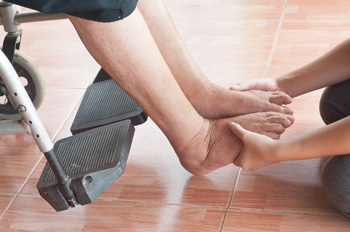Neuropathy is a condition in which the nerves in the body become damaged from a number of different illnesses. Nerves from any part of the body, including the foot, can be damaged. There are several forms of neuropathy including peripheral neuropathy, cranial neuropathy, focal neuropathy, and autonomic neuropathy. Furthermore there is also mononeuropathy and polyneuropathy. Mononeuropathies affect one nerve while polyneuropathies affect several nerves. Causes of neuropathy include physical injury, diseases, cancers, infections, diabetes, toxic substances, and disorders. It is peripheral neuropathy that affects the feet.
The symptoms of neuropathy vary greatly and can be minor such as numbness, sensation loss, prickling, and tingling sensations. More painful symptoms include throbbing, burning, freezing, and sharp pains. The most severe symptoms can be muscle weakness/paralysis, problems with coordination, and falling.
Podiatrists rely upon a full medical history and a neurological examination to diagnose peripheral neuropathy in the foot. More tests that may be used include nerve function tests to test nerve damage, blood tests to detect diabetes or vitamin deficiencies. Imaging tests, such as CT or MRI scans, might be used to look for abnormalities, and finally nerve or skin biopsies could also be taken.
Treatment depends upon the causes of neuropathy. If the neuropathy was caused by vitamin deficiency, diabetes, infection, or toxic substances, addressing those conditions can lead to the nerve healing and sensation returning to the area. However if the nerve has died, then sensation may never come back to the area. Pain medication may be prescribed for less serious symptoms. Topical creams may also be tried to bring back sensation. Electrical nerve stimulation may be used for a period of time to stimulate nerves. Physical therapy can strengthen muscle and improve movement. Finally surgery might be necessary if pressure on the nerve is causing the neuropathy.
If you are experiencing sensation loss, numbness, tingling, or burning sensations in your feet, you may be experiencing neuropathy. Be sure to talk to a podiatrist to be diagnosed right away.
 Patients who are afflicted with peripheral neuropathy are typically familiar with a tingling sensation or numbness in their feet that generally accompanies this uncomfortable condition. Additional symptoms may include difficulty in walking, feeling a stabbing pain that may be in the feet, or experiencing muscle weakness. Research has shown the peripheral nerves are categorized into three areas. One group is known as the motor nerves and will affect performing activities that may include walking or picking up an object. Additionally, sensory nerves affect the ability to differentiate between hot and cold, or objects that are smooth or rough. Finally, autonomic nerves control specific functions of the body, which may include digestion, heart rate, and blood pressure. If you are experiencing symptoms in the feet that may indicate neuropathy, it is suggested to consult with a podiatrist, so a proper diagnosis can be performed.
Patients who are afflicted with peripheral neuropathy are typically familiar with a tingling sensation or numbness in their feet that generally accompanies this uncomfortable condition. Additional symptoms may include difficulty in walking, feeling a stabbing pain that may be in the feet, or experiencing muscle weakness. Research has shown the peripheral nerves are categorized into three areas. One group is known as the motor nerves and will affect performing activities that may include walking or picking up an object. Additionally, sensory nerves affect the ability to differentiate between hot and cold, or objects that are smooth or rough. Finally, autonomic nerves control specific functions of the body, which may include digestion, heart rate, and blood pressure. If you are experiencing symptoms in the feet that may indicate neuropathy, it is suggested to consult with a podiatrist, so a proper diagnosis can be performed.
Neuropathy
Neuropathy can be a potentially serious condition, especially if it is left undiagnosed. If you have any concerns that you may be experiencing nerve loss in your feet, consult with one of our podiatrists from Family Foot & Ankle Center. Our doctors will assess your condition and provide you with quality foot and ankle treatment for neuropathy.
What Is Neuropathy?
Neuropathy is a condition that leads to damage to the nerves in the body. Peripheral neuropathy, or neuropathy that affects your peripheral nervous system, usually occurs in the feet. Neuropathy can be triggered by a number of different causes. Such causes include diabetes, infections, cancers, disorders, and toxic substances.
Symptoms of Neuropathy Include:
Those with diabetes are at serious risk due to being unable to feel an ulcer on their feet. Diabetics usually also suffer from poor blood circulation. This can lead to the wound not healing, infections occurring, and the limb may have to be amputated.
Treatment
To treat neuropathy in the foot, podiatrists will first diagnose the cause of the neuropathy. Figuring out the underlying cause of the neuropathy will allow the podiatrist to prescribe the best treatment, whether it be caused by diabetes, toxic substance exposure, infection, etc. If the nerve has not died, then it’s possible that sensation may be able to return to the foot.
Pain medication may be issued for pain. Electrical nerve stimulation can be used to stimulate nerves. If the neuropathy is caused from pressure on the nerves, then surgery may be necessary.
If you have any questions, please feel free to contact one of our offices located in Raleigh and Henderson, NC . We offer the newest diagnostic and treatment technologies for all your foot care needs.
Read more about Neuropathy